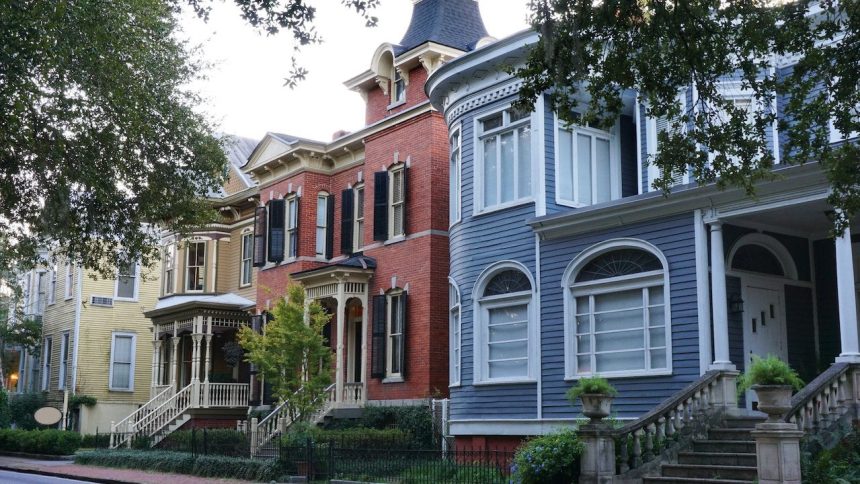Paul Hamilton/Getty Images
If you’re in the market to buy a home, you’ll likely wind up looking at lots of listings and touring many different types of properties. You may see some that are brand-new construction, and some that are a century old. Both have their appeal. If you’re not sure which one is best for you, here are some of the differences between old houses and new houses.
Old vs. new homes
While many aspects of housing have held true across the decades, there are plenty of different trends that affect homebuilding over time. Depending on the age of a home, you will notice different features, building methods and design choices.
Historic homes
Older homes are likely to have very different design sensibilities than modern ones. This is in part due to technological innovations, but also differing tastes over the years.
For example, truly historic homes often lack ductwork or central air systems, because those technologies did not yet exist when they were built. They may also boast old-school features like cast-iron radiators, clawfoot tubs and Victorian-style woodwork. And they tend to have smaller, more individual rooms, as opposed to the spacious open floor plans of modern homes.
These homes will also have different architectural styles than a newer build. For instance, midcentury homes often utilized unusual shapes and colors. And many neighborhoods built in that era have a cookie-cutter style, with the homes within each development all looking very similar to each other.
New-construction homes
If you’re looking at newly constructed homes, you’re likely to notice some current trends in how they are designed and built. Modern homes may sport features like metallic roofs and curvy building elements, for example. You may also see greater use of outdoor space — something that became much more important to homeowners during the pandemic.
Other trends may also be apparent, such as smart technology, energy-efficient features, central air systems and living rooms oriented around space for a TV or entertainment center, rather than a fireplace.
Older home pros and cons
Pros
- Location: Older homes are typically located closer to the center of towns, and in more walkable areas near more amenities. If you want a really central location, you may need to buy an older home.
- Charm: Unique architectural details and flourishes give an older home personality that might be lacking in a newer, boxier build.
- Value: A home with a strong sense of history, or one with a desirable architectural style in a historic neighborhood, may be worth more than a newer home of similar size.
- Speed: If you’re buying a new-build home, you might face construction delays or supply-chain issues that slow down the process. With an old home, that isn’t a concern.
Cons
- Outdated infrastructure: Technology has changed a lot over time, obviously. Old homes may still use older heating and cooling systems or have fewer electrical outlets than you’d like. Similarly, these homes might not be up to modern code, and renovating to bring things up to today’s standards can be costly.
- Expensive upkeep: Brooks Conkle, a Mobile, Alabama–based Realtor, points out that ongoing maintenance costs can be higher in an older home. “The repair costs for older homes can quickly escalate,” he says. “Be sure to get a home inspection and really understand the home well. A newer home is [most likely] going to be in better condition and more energy efficient.”
- Small or non-standard sizing: Older homes are often not designed for the size of modern appliances or furniture. You might find that your living room is too small for your sofa, for example, or that your kitchen requires an unusually sized refrigerator.
Newer home pros and cons
Pros
- Energy efficiency: Newer homes are often designed with energy-efficient systems and are usually much cheaper to heat and cool.
- Amenities: Newer homes can also take advantage of modern technology. That means they tend to already have conveniences like central air and dishwashers, for instance, whereas older homes might have to be retrofitted for this equipment.
- Customization: If you’re buying a new-construction home, many builders offer the opportunity to customize it to your specific desires.
- Home warranties: New builds also often come with home warranties. These can help protect you from major expenses that might pop up, such as unexpected HVAC or appliance issues.
- Builder incentives: Homes being sold by the builder directly may come with additional incentives to buy, such as rate buy-downs.
Cons
- High prices: With all their modern bells and whistles, newer homes are often more expensive than older ones. That can be particularly true of brand-new construction, where the buyer will be the first person ever to live there.
- Homeowners associations: Many new developments are managed by a homeowners association, or HOA. That’s not necessarily a bad thing, but it does mean paying extra fees and dealing with restrictions on how you can use your home.
- Competition: For a brand-new, move-in-ready home in a desirable location, you’ll probably face stiff competition — and in particularly busy markets, potentially even a bidding war.
FAQs
Read the full article here
















